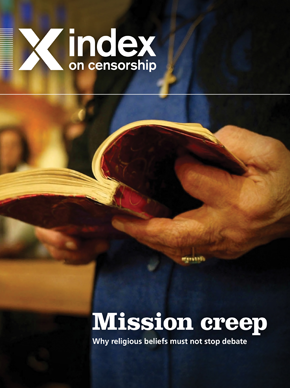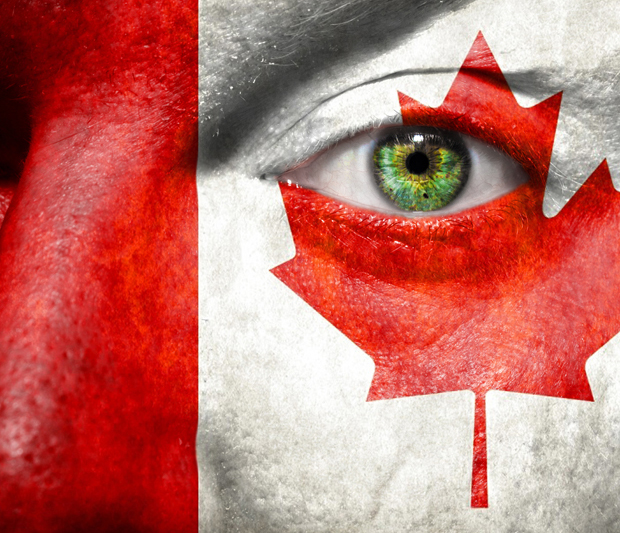9 Dec 2013 | Volume 42.04 Winter 2013
 The upcoming winter issue of Index on Censorship magazine includes a special report on religion and tolerance, with articles from around the world.
The upcoming winter issue of Index on Censorship magazine includes a special report on religion and tolerance, with articles from around the world.
Writers include the Bishop of Bradford, Salil Tripathi, Samira Ahmed and Kaya Genc. There’s an interview with Gurpreet Kaur Bhatti ahead of the opening of her new play, and 10 years after Behzti; while cartoonist Martin Rowson writes and draws about how comedy and religious offence come into conflict. Natasha Joseph writes from South Africa on why some portraits of President Zuma made him see red. Alexander Verkhovsky discusses the new blasphemy law in Russia, and former BBC mobile editor Jason DaPonte discusses why computer games are not all bad.
As part of the special report, writer Brian Pellot goes online with the Mormons to see how they use technology to talk to the unconverted, and asks if online chats will replace missions. Germans have been outraged by the revelations about US and UK surveillance, now they have plans to do something different to put a stop to snooping in the future, Sally Gimson reports. From Brazil, Ronaldo Pelli looks at the reaction to people practising religions of African origin, and investigative writer and author of Fast Food Nation Eric Schlosser talks about the threats to investigative journalism now and in the future.
Also in this issue:
Padraig Reidy on flags, controversy and Northern Ireland
Xiao Shu on the Chinese crackdown on the New Citizens’ Movement
Kaya Genc on the rise of a new type of media in Turkey
6 Dec 2013 | Canada, News and features, Politics and Society

(Image: Shutterstock)
Canadian journalists will face fines for commenting on the striking action of trade unionists under new legislation passed in the province of Alberta. As reported by Index on Censorship earlier this week Bill 45 and Bill 46 will see heavy sanctions placed on those who partake in illegal picketing or comment publicly on those doing so. Both bills passed through their third and final readings on Wednesday 4 December, in front of a full gallery of concerned members of the public
Journalists now face fines of $500 a day for any comments made regarding support for union strikes. Alongside this, Bill 45 also limits the discussion of striking action or threats to strike by civil servants, fining unions $1 million a day unless they are able to convince a court they were not responsible for or encouraging of the striking talk.
Don Braid said in the Calgary Herald this week: “It’s hard to imagine a more blatant violation of free speech, a right that always implies a certain social anarchy to function usefully. People are not allowed to break laws, but they are permitted, except in obvious cases of threatening harm, to talk about challenging, testing, pushing or even breaking them. The offence is in the breaking, not the talking. But not for Alberta’s public unions. Talking is now pretty much illegal.”
An earlier version of this article referred to Alberta as a state. It is a province.
This article was originally posted on 6 Dec 2013 at indexoncensorship.org
4 Dec 2013 | Africa, Kenya, News and features
 As Kenya prepares to mark its golden jubilee on 12 December, the country is still behind in tackling its biggest threats to free expression. Corruption, ignorance and political meddling still reign supreme.
As Kenya prepares to mark its golden jubilee on 12 December, the country is still behind in tackling its biggest threats to free expression. Corruption, ignorance and political meddling still reign supreme.
Articles 33 and 34 of the Constitution of Kenya respectively grant the freedom of expression and the freedom of the media. The articles cover individual as well as media freedom and independence free of government interference or intimidation, provided the rights and reputations of others are not infringed. These freedoms, however, will seemingly come at a heavy cost to the recipients.
Corruption has permeated every aspect of Kenyan life. Institutions of repute have fallen prey to the graft menace including the police service, the judiciary, and government ministries. The private sector has also not escaped corruption’s grip. Corruption robs Kenyans of their rights. Various reports by organs like Transparency International perennially rank Kenya among the top most corrupt countries.
There are often untold stories of how envelopes with “tokens” are passed around to journalists after press conferences or meetings by certain organisations, spokespersons or public figures. For all intents and purposes, this is in exchange for good press coverage. There are also cases of journalists being bribed to kill stories that may incriminate or taint the images of certain politicians or advertisers.
The duo of investigative journalists, John Allan-Namu and Mohamed Ali, were once offered a bribe of one million dollars in early 2009 to drop a story they were working on regarding a certain company offering vehicle tracking services. They declined the offer, going on to expose the company’s fraudulent activities, as well as the bribery attempt itself. But this raised the question: how many journalists have accepted bribes?
Media literacy is also a problem. The average Kenyan takes up whatever they see, hear or read about in the media as absolute truth. Media literacy is important for a person to be able to analyze and evaluate content disseminated via the various media outlets as well as to distinguish truth from falsehood, hoax or propaganda. Without this, most Kenyans accept everything portrayed in the media. This is dangerous as messages can be tailored with ulterior motives and used to manipulate the masses and their perceptions.
Ignorance also causes people not to know where the boundaries are in terms of their freedom of expression as well as how much power they really wield. Many crimes go unreported yearly because citizens may be apathetic or unaware of reporting procedures. It is not uncommon to find people who do not know their leaders are.
Political and government interference also play a major role in liberty of expression. The Kibaki administration saw many strides made in the expansion of the democratic space although it was no stranger to controversy. The infamous raid on the Standard Group by masked gunmen on March 2, 2006 sticks out like a sore thumb in the history of media freedom. Even more recently, there is the Kenya Information and Communications (Amendment) Bill 2013, more popularly known as the Media Bill. Some contentious sections of the bill include forming of a powerful Communications and Multimedia Appeals tribunal to handle regulatory matters; receive complaints and provide judgment over contravention within the new Communications Authority of Kenya or the Media Act.
There is also the imposing of fines of up to 20 million Kenyan shillings for media houses and one million shillings for individual journalists, as well as the powers to suspend and remove a journalist from the roll of practice. This is an unacceptable state of affairs. The media’s role as the fourth estate providing oversight over the other arms of the state, cannot be taken for granted or trampled on.
This article was posted on 4 Dec 2013 at indexoncensorship
3 Dec 2013 | Canada, Politics and Society

(Photo illustration: Shutterstock)
Journalists in the Canadian province of Alberta could see their right to free speech stifled as new legislation, aimed at suppressing the illegal striking of union members, will impose heavy fines on those who comment publically in favour of those picketing.
For members of the Alberta Union of Provincial Employees (AUPE) it has been illegal to strike since 1977. The new legislation, introduced by Alison Redford’s Progressive Conservative government, will abolish the action of arbitration, as well as freezing wages and imposing fines, both for those who take part any form of “illegal” striking and those who comment on it.
According to Bob Barnetson, the director of the Human Resources and Labour Relations programme at Athabasca University, Bill 45 would see newspaper columnists who write opinion pieces about the plight of workers, or those who merely comment “the only option they have is to strike” handed a hefty penalty for their work. Making such comment would be a violation of section 4.4 of the bill.
“So what happens to the editor or academic?” Barnetson wrote on his blog last week. “Well, s.18.1 says that if you violate s.4.4 you are guilty of an offence. Under s.18.1(d), the editor or academic would be liable for a fine of $500 a day per day of the contravention. Section 20(a) says that prosecution may occur within 1 year of the last day the offense occurred”.
David Climenhaga, a well-known labour blogger in Alberta, believes the imposed fines would stretch as far as catching-out members of the public who showed up at an “illegal” picket line or members of other unions, not subjected to the legislation, who joined a picket out of solidarity: “So, while the bill is mostly careful to restrict penalties to union members and officers, on the always dangerous question of free speech, it extends its attack to “any person” who says the wrong thing to a civil servant.”
Bill 46, which will run alongside Bill 45, will see the 21,642 members of the AUPE forced back to the bargaining table in January or accept a 0% wage increase for the next two years.
An earlier version of this article referred to Alberta as a state. It is a province.
 The upcoming winter issue of Index on Censorship magazine includes a special report on religion and tolerance, with articles from around the world.
The upcoming winter issue of Index on Censorship magazine includes a special report on religion and tolerance, with articles from around the world.

 As Kenya prepares to mark its golden jubilee on 12 December, the country is still behind in tackling its biggest threats to free expression. Corruption, ignorance and political meddling still reign supreme.
As Kenya prepares to mark its golden jubilee on 12 December, the country is still behind in tackling its biggest threats to free expression. Corruption, ignorance and political meddling still reign supreme.